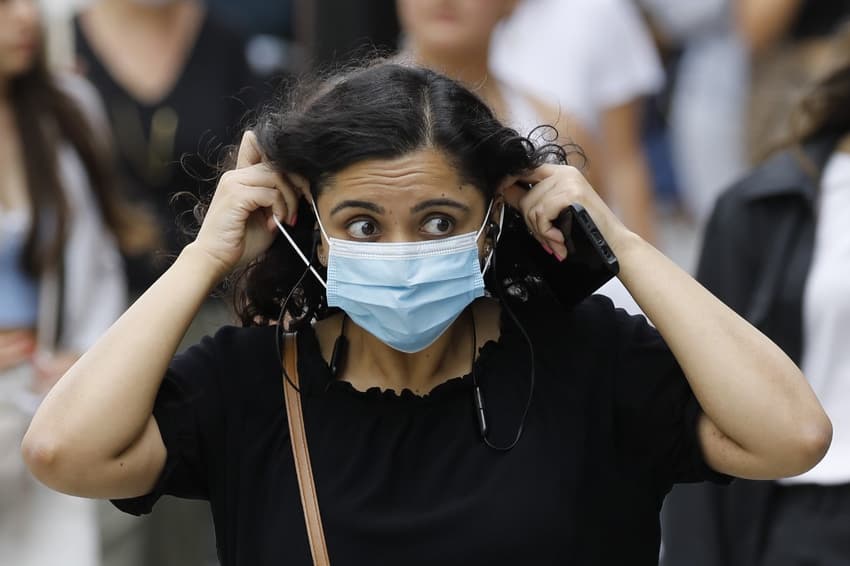Swiss authorities explain which masks are most and least effective

According to Swiss health officials, not all face masks are created equal — some are more appropriate for protecting the wearer from getting contaminated with coronavirus, while others are more effective in preventing the spread of infection to others.
The Federal Office of Public Health (FOPH) has published guidelines about the efficacy of various mask models currently available in Switzerland.
It also explains which types of face coverings should be avoided.
Here is an overview of FOPH’s recommendations:
Single-use disposable masks for people who are ill
If you have symptoms of Covid-19 or an acute respiratory disease in general, FOPH urges the use of masks that can be disposed of immediately after wearing.
“They should be thrown away after use, since they are certainly contaminated”, FOPH spokesperson Grégoire Gogniat told the Swiss media.
Cloth masks for general use
The Swiss COVID-19 Science Task Force has drawn up a standard which this type of textile masks must meet.
For instance, it establishes criteria such as filtration efficiency, splash resistance and air permeability.
READ MORE: UPDATE: Where in Switzerland are masks compulsory right now?
If the mask is neither dirty nor damp after use, it should be kept in a resealable bag. However, it is important to wash it daily with a heavy-duty detergent at the temperature of least 60 degrees.
Also keep in mind that cloth masks don’t have an indefinite life span. The more often the mask is washed the more it expands, allowing droplets from outside to penetrate.
So while this type of mask can be used many times, it would have to be replaced after a while.
Filtering face piece (FFP) or FFP2/FFP3 mask – not recommended for private use
This type of mask protects the wearer from solid and liquid particles and aerosols. However, it doesn’t protect others.
In fact, as FFPs don’t filter air that is breathed out, they could actually spread the virus if worn by an infected person.
A scarf or a piece of cloth — insufficient protection
According to FOPH, “covering your face with a scarf or cloth does not protect you sufficiently from becoming infected and is of only limited use in protecting others”.
Face shields: for your eyes only
FOPH is warning that plastic visors are not substitute as a face mask.
“They protect the eyes from possible infection through droplets, but the possibility of infection via the nose or mouth cannot be excluded”.
Shields should be worn only in conjunction with a mask, FOPH added.
Comments
See Also
The Federal Office of Public Health (FOPH) has published guidelines about the efficacy of various mask models currently available in Switzerland.
It also explains which types of face coverings should be avoided.
Here is an overview of FOPH’s recommendations:
Single-use disposable masks for people who are ill
If you have symptoms of Covid-19 or an acute respiratory disease in general, FOPH urges the use of masks that can be disposed of immediately after wearing.
“They should be thrown away after use, since they are certainly contaminated”, FOPH spokesperson Grégoire Gogniat told the Swiss media.
Cloth masks for general use
The Swiss COVID-19 Science Task Force has drawn up a standard which this type of textile masks must meet.
For instance, it establishes criteria such as filtration efficiency, splash resistance and air permeability.
READ MORE: UPDATE: Where in Switzerland are masks compulsory right now?
If the mask is neither dirty nor damp after use, it should be kept in a resealable bag. However, it is important to wash it daily with a heavy-duty detergent at the temperature of least 60 degrees.
Also keep in mind that cloth masks don’t have an indefinite life span. The more often the mask is washed the more it expands, allowing droplets from outside to penetrate.
So while this type of mask can be used many times, it would have to be replaced after a while.
Filtering face piece (FFP) or FFP2/FFP3 mask – not recommended for private use
This type of mask protects the wearer from solid and liquid particles and aerosols. However, it doesn’t protect others.
In fact, as FFPs don’t filter air that is breathed out, they could actually spread the virus if worn by an infected person.
A scarf or a piece of cloth — insufficient protection
According to FOPH, “covering your face with a scarf or cloth does not protect you sufficiently from becoming infected and is of only limited use in protecting others”.
Face shields: for your eyes only
FOPH is warning that plastic visors are not substitute as a face mask.
“They protect the eyes from possible infection through droplets, but the possibility of infection via the nose or mouth cannot be excluded”.
Shields should be worn only in conjunction with a mask, FOPH added.
Join the conversation in our comments section below. Share your own views and experience and if you have a question or suggestion for our journalists then email us at [email protected].
Please keep comments civil, constructive and on topic – and make sure to read our terms of use before getting involved.
Please log in here to leave a comment.